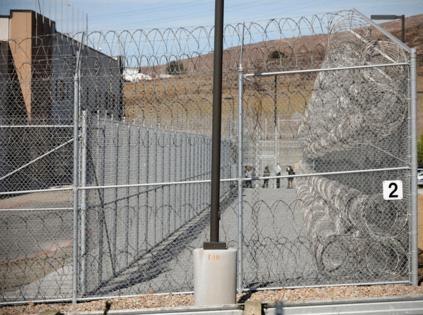Mental health services lacking in immigration detention centers, state report finds
Published in News & Features
The six federal immigration detention centers in California, including the facility in Otay Mesa, are not providing sufficient mental health services to people in custody, according to the California Department of Justice, which looked at confinement conditions at the sites.
The report released Tuesday also found disproportionate use of force against detainees with mental illness statewide. Locally, the report highlights what state justice officials said is insufficient staffing for medical and mental health services at the Otay Mesa Detention Center, and that mental health and medical records were not properly updated and maintained.
“I’ll just say that what we found was alarming,” Attorney General Rob Bonta said during a news conference at his San Diego office Tuesday. He later said his office’s inspections revealed “a sobering and stark and dark picture.”
At some sites, he said, detainees were over-disciplined, and other sites had lapses in securing treatment for infectious diseases. Inspections also found deficiencies in mental health record-keeping and weaknesses in suicide prevention, Bonta said.
Bonta said it is critical to keep an eye on the conditions at the facilities as the Trump administration cracks down on immigration.
Population levels are climbing from lows seen during the COVID-19 pandemic. The state says the six facilities housed 2,303 detainees during its reviews in 2023. The number, as of about two weeks ago, had reached 3,104 detainees. Bonta said he predicts that the number “will only continue to skyrocket” under the Trump administration.
Additionally, the report indicates that just under 26% of those in custody as of earlier this month had a criminal history.
Tuesday’s report is the fourth released by the state Department of Justice since the state Legislature moved less than a decade ago to keep eyes on the inside of the federal facilities. The new report looks at data primarily from 2021 to 2023, including visits to the six facilities last year, and it focuses on mental health matters and the availability and quality of services, an issue flagged in earlier reports.
Bonta’s office says work has already started on the next report, and it likely will focus on due process concerns, which have garnered increased national attention due to the Trump administration’s ramped-up immigration enforcement.
All six immigration facilities are run by private companies; the Otay Mesa center is run by CoreCivic. Neither Immigration and Customs Enforcement nor CoreCivic responded Tuesday to the report’s findings.
The report alleges inadequate staffing at the Otay Mesa site for both mental health and medical care, and insufficient suicide prevention and intervention practices.
Otay Mesa improved upon some of the issues the state identified in its 2021 report, including better availability of prescription medication for mental health conditions, confidentiality and language access.
A review of the files by the state turned up one instance in which a person detained at Otay Mesa said they told the facility upon arrival that they used psychotropic medication but did not see a psychiatrist for 16 days.
The report also found that limited mental health visits “created gaps in identifying history of trauma or sexual abuse.”
The most common mental health conditions at the local site identified included voluntary starvation (although the report does not say if it was part of a hunger strike), anxiety, depression, post-traumatic stress disorder, adjustment disorder and psychosis.
The report said the Otay Mesa facility should place more attention on hospitalizing people on suicide watch for more than two days. It notes one instance in which a detainee was placed on suicide watch on a Friday, had no mental health visits over the weekend, and by Monday had decompensated to the point of eating his own waste. He was not hospitalized until Tuesday.
Otay Mesa recorded no suicides during the review period.
The number of clinicians at the Otay Mesa facility increased after CoreCivic took over from ICE the job of providing services. But the report found that the medical providers were short-staffed on nights and weekends.
©2025 The San Diego Union-Tribune. Visit sandiegouniontribune.com. Distributed by Tribune Content Agency, LLC.







Comments